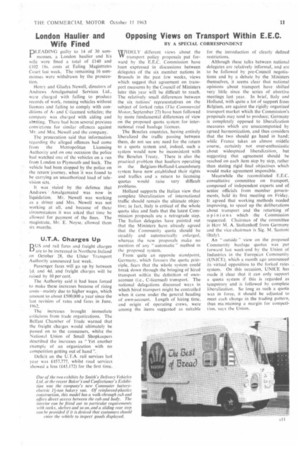W IDELY different views about the transport policy proposals put forward
Page 13

If you've noticed an error in this article please click here to report it so we can fix it.
by the E.E.C. Commission have been expressed -in discussions between delegates of the six member nations in Brussels in the past few weeks, views which suggest that agreement on transport measures by the Council of Ministers later this year will he difficult to reach. The relatively small differences between the six nations' representatives on the subject of forked rates (The Commercial Motor, September 27) have been followed by more fundamental differences of view on the proposed quota system for international road haulage licences.
The Benelux countries, having entirely liberalized the traffic passing between them, do not see any need for the return to a quota system and, indeed, such a system would now he inconsistent with the Benelux Treaty. There is also the practical problem that hauliers operating in the Belgium-Holland-Luxembourg system have now established their rights and traffics and a return to licensing quotas would raise very difficult problems.
Holland supports the Italian view that complete liberalization of international traffic should remain the ultimate objective; in fact, Italy is critical of the whole quota idea and feels that the latest Commission proposals are a retrograde step. The Italian delegates have pointed out that the Ministers have. already agreed that the Community quota should be steadily and automatically enlarged, whereas the new proposals make no mention of any " automatic " method in the proposed system.
From quite an opposite standpoint, Germany, which favours the quota principle, fears that the whole system could break -down through the bringing of hired transport within the definition of ownaccount (i.e., C-licensed) transport. The national delegations discussed ways in which hired transport might he controlled when it came under the general heading of own-account. Length of hiring time. and origin of operating crews, were among the items suggested as suitable for the introduction of clearly defined restrictions.
Although these talks between national delegates are relatively informal, and are to be followed by pre-Council negotiations and by a debate by the Ministers themselves, it seems clear that national opinions about transport have shifted very little since the series of abortive meetings last year. En brief, Italy and Holland, with quite a lot of support from Belgium, are against the rigidly organized transport market which the Commission's proposals may tend to produce; Germany is completely opposed to liberalization measures which are unaccompanied by agreed harmonization, and thus considers that the two should go hand in hand; while France takes an almost middle course, certainly not over-enthusiastic about widespread liberalization, but suggesting that agreement should be reached on each item step by step, rather than stating rigid final objectives which would make agreement impossible.
Meanwhile the reconstituted E.E.C. consultative committee on transport, composed of independent experts and of senior officials from member governments, held its first meeting on Friday. It agreed that working methods needed improving, to speed up the deliberations about transport and the returning of opinions which the Commission requested. Chairman of the committee is Herr M. A. Stoltenhoff from Germany and the vice-chairman is Sig. M. Santoni (Italy).
An " outside " view on the proposed Community .haulage quotas was put forward last week-end by the Union of Industries in the European Community (UNICE). which a month ago announced its virtual opposition to the forked rates system. On this occasion, .UNICE has made it clear that it can only support a quota system if this is regarded as .temporary and is followed by complete liberalization. So long as such a quota was in force, it should be adjusted to meet each change in the trading pattern, thus ma:ntaining a margin for competition, says the Union.




















































































































